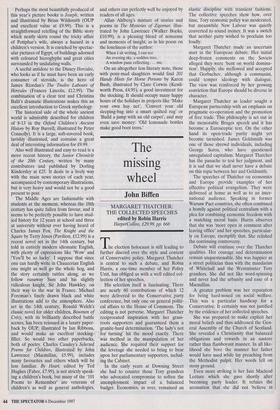The missing wheel
John Biffen
MARGARET THATCHER: THE COLLECTED SPEECHES edited by Robin Harris HarperCollins, £29.99, pp. 668 The election holocaust is still leading to further discord over the style and content of Conservative policy. Margaret Thatcher is central to such a debate, and Robin Harris, a one-time member of her Policy Unit, has obliged us with a well edited col- lection of her speeches.
His selection itself is fascinating. There are nearly 60 contributions of which 12 were delivered to the Conservative party conference, but only one on general politi- cal affairs to the House of Commons. The editing is not perverse. Margaret Thatcher reciprocated inspiration with her grass- roots supporters and guaranteed them a granite-hard determination. 'The lady's not for turning' hit the mood exactly. There was method in the manipulation of her audience. She required their support for the leverage she needed to bring to bear upon her parliamentary supporters, includ- ing the Cabinet.
In the early years at Downing Street she had to counter those Tory grandees who advocated compromise to soften the unemployment impact of a balanced budget. Economics, as ever, remained an elastic discipline with transient fashions. The collective speeches show how, over time, Tory economic policy was moderated, but meanwhile New Labour was quietly converted to sound money. It was a switch that neither party wished to proclaim too loudly.
Margaret Thatcher made an uncertain start in the European debate. Her initial deep-frozen comments on the Soviets alleged they were 'bent on world domina- tion'. Happily, she mellowed and accepted that Gorbachev, although a communist, could temper ideology with dialogue. The view was reinforced by her growing conviction that Europe should be diverse in character.
Margaret Thatcher as leader sought a European partnership with an emphasis on pragmatic co-operation and the promotion of free trade. This philosophy is set out in the memorable Bruges speech and it has become a Eurosceptic text. On the other hand its open-trade purity might yet become tarnished. James Goldsmith was one of those shrewd individuals, including George Soros, who have questioned unregulated capitalism. Margaret Thatcher has the panache to test her judgment, and it is sad that we shall never have a debate on this topic between her and Goldsmith.
The speeches of Thatcher on economics and Europe provide examples of her effective political evangelism. They were delivered at home as well as to an inter- national audience. Speaking in former Warsaw Pact countries, she often combined a homily against political centralism with a plea for combining economic freedom with a matching moral basis. Harris observes that she was 'more open in comment after leaving office' and her speeches, particular- ly on Europe, exemplify that. She relished the continuing controversy.
Debate will continue over the Thatcher qualities. Her courage and determination remain unquestionable. She was happier as a street politician than with the mandarins of Whitehall and the Westminster Tory grandees. She did not like word-spinning and never had the urbanity and ease of a Macmillan.
A greater problem was her reputation for being hard-nosed on social welfare. This was a particular handicap for a Conservative. It certainly was not justified by the evidence of her collected speeches.
She was prepared to make explicit her moral beliefs and thus addressed the Gen- eral Assembly of the Church of Scotland. She revealed a Christianity that balanced obligations and rewards in an austere rather than flamboyant manner. In all like- lihood she bore the manner her father would have used while lay preaching from the Methodist pulpit. Her words fell on stony ground.
Even more striking is her Iain Macleod Lecture which she gave shortly after becoming party leader. It refutes the accusation that she did not 'believe in society'. That phrase was torn from its context and used to discredit her by clerical and political opponents alike. She made a fascinating critique of attitudes, observing that . . man is a social creature, born into family, clan, community, nation, brought up in dependence'.
Again she emphasised that 'economic choices have a moral dimension'. Finally she gave an accolade to the original One Nation Group who had included Macleod, Powell and Heath. They were commended for the workmanlike manner in which they tackled social reform.
It was her loss that despite her political skills on Europe and the economy she was never able to lead the social debate. Indeed her views were successfully parodied as though she had become the Iron Maiden of the Welfare State. The failure to communi- cate the Conservative case for health and the social services need not have been fatal, but it was style as well as cash that was missing. The government by the late 1980s seemed more committed to material success than continuing the post-war welfare consensus. This policy became a missing political wheel that derailed, firstly Margaret Thatcher and eventually the Con- servative government.



















































































 Previous page
Previous page